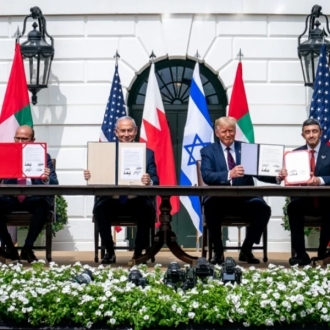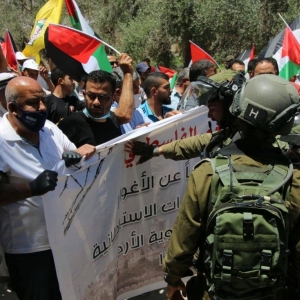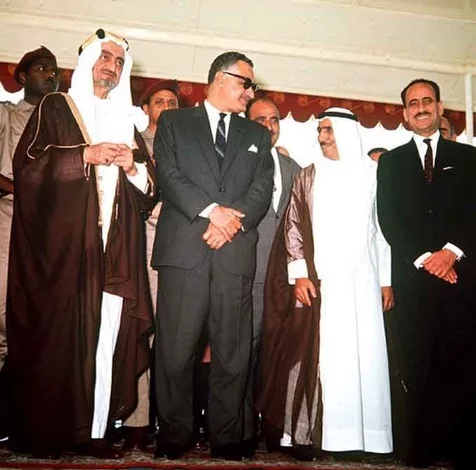Middle East
The New Israeli-Arab ‘Peace’ Deal






With the outbreak of the ‘normalization’ of relations between Israel and UAE and Bahrain, we ask what is behind the “peace” campaign that has replaced the threats of annexation by Netanyahu’s crisis government
The immediate threat of the escalation of the Israeli-Palestinian conflict as a result of an official annexation of parts of the West Bank by Israel, and consequently the tightening of the occupation, has suddenly been replaced by a regional “peace” campaign. On September 15th in a ceremony at the White House, Netanyahu, while signing “peace agreements” with the United Arab Emirates and Bahrain, wished his new friends “a-Salamu Alaykum, peace unto thee, Shalom”. He clearly hoped that the event would also help him restore public support with the image of what he presented as a historic achievement under his leadership. History had other plans, as the news has been submerged in the tumult of the catastrophic health and economic crisis, and has not diverted attention from the on-going demonstrations demanding the resignation of Netanyahu.
Shortly after Netanyahu returned to power in 2009, he delivered his Bar-Ilan speech, in which he falsely claimed to recognise the Palestinians’ right to a state. Following this, two Persian Gulf monarchies, Oman and Qatar, offered to consider the renewal of diplomatic relations with Israel — which had earlier existed briefly on a partial basis following the Oslo Accords — in exchange for a construction freeze in the settlements and the resumption of negotiations between Israel and the Palestinians. The proposal had been pushed by the Obama administration in an attempt to provide the second Netanyahu government with “compensation” for a temporary freeze on construction in the settlements. The Palestinian Authority warned then that “this is not a new attempt by Israel to open up to the Arab world at the expense of the Palestinians via hollow initiatives”. The freeze was a political maneuver, leveraged to accelerate settlement construction, but the Israeli regime did not manage to achieve the normalization agreements it wanted. This time another deal has been proposed.
On the face of it, for the first time in more than a quarter of a century, the State of Israel has signed official “peace agreements” with Arab countries. The two monarchies are the first countries in the Gulf to “normalize relations” with Israel. The “Abraham Accords”, sponsored by Trump, are intended to be joined by agreements with a number of other countries with which Israel is in contact.
In his speech at the White House ceremony, Netanyahu promised that the new “peace” could "eventually end the Israeli-Arab conflict once and for all.” Reports during the ceremony itself of Israeli civilians being wounded by rocket fire from the Islamic Jihad provided a painful reminder of the fraudulent nature of such peace propaganda.


Netanyahu did not bother to mention the Palestinians in his speech at the White House. Back on May 14, 2018, when the new US Embassy in Jerusalem was inaugurated, Netanyahu also knew how to declare a ‘great day for peace’, while dozens of unarmed Palestinian demonstrators were being shot dead and thousands wounded. The policies of siege, occupation and settlements during his rule over the past decade have pushed the peace horizon even further into the distance, and the atrocities surrounding the crisis in the Gaza Strip, including thousands of residents killed by Israeli fire, have reached record levels.
Peace between capitalist countries is better than war between them, but does this new arrangement really reduce the prospects for any further bloodshed? Trump spoke of “blood shed in the sands” and Netanyahu “of the horrors of the war, of his wounding and of the killing of his comrades.” Journalist Amnon Abramovich satirically scolded Netanyahu, asking “In which of the wars against the UAE or against Bahrain did this happen, Mr. Prime Minister?” [There has never been a war between the countries].
Israel has maintained informal relations with the Emirates and Bahrain following the Oslo period, and these have strengthened since. About 500 Israeli corporations have operated in the Emirates since an Israeli diplomatic mission was opened there in 2015. The outbreak of normalization now constitutes a further shift in regional relations, but it is a stage of the formal institutionalization of relations as part of a lengthy process of developing the geopolitical alliance between Israel and the Sunni Arab states. This is formed primarily on the basis of overlapping interests in rivalry against the Iranian regime, but also in the context of an escalating regional conflict with Erdoğan’s rule in Turkey, as well as the rest of the fabric of economic, military and political interests.
War is peace
Netanyahu praised himself for having led the State of Israel to this moment, from a so-called “socialist state to a state with a free market”, the policies he pursued in relation to Iran, and the expansion of Israel’s foreign relations in recent years.
His adoption of the slogan “Peace through strength” is intended to foster the myth that the military and economic power of Israeli capitalism promotes regional peace. When Netanyahu talks about economic “might”, he is of course, not talking about the two million Israelis who lived in poverty even before the pandemic, or the million unemployed or contract workers, or Palestinian workers at the checkpoints. Israel was never in its history a socialist state, but the neo-liberal counter-revolution, with Netanyahu as one of its leaders, has undermined the health system’s preparedness for the pandemic, welfare services and working conditions, and has fueled inequality. This contributed to the strengthening of the ruling class in Israel.
Against the background of regional conflicts, and with the support of the United States and other world powers, Israel has also become the world’s largest exporter of weapons and security technologies in relation to its population size. The economic and military intensification of Israeli capitalism has, of course, played a role in the development of its foreign relations. This has included the official renewal of alliances with neo-colonial countries in Africa in recent years, such as Muslim Chad in January 2019, although the declaration of formal relations in that case was not branded as “peace”. At regional level, as described, the alliance between Israel and a number of Arab regimes is strengthening. In the distant past, Iran and Turkey were the main strategic allies of Israel in the region. Alliances change.
As in George Orwell’s dystopian 1984, in which the ‘Ministry of Peace’ was entrusted with waging the permanent war, titled of course as ‘peace’, the new outbreak of ‘normalisation’ is integrated into a policy of continuing war: continuing the development of the conflict with Iran, continuing the regional arms race and continuing the policy of Israeli-Palestinian “conflict management”, which seeks to perpetuate the occupation and the bloody national conflict. The Trump administration has contributed to the escalation of regional conflicts, particularly with its policy of applying “maximum pressure” on Iran, as well as with its attacks on the Palestinians.
As in George Orwell’s dystopian 1984, in which the ‘Ministry of Peace’ was entrusted with waging the permanent war, titled of course as ‘peace’, the new outbreak of ‘normalisation’ is integrated into a policy of continuing war: continuing the development of the conflict with Iran, continuing the regional arms race and continuing the policy of Israeli-Palestinian “conflict management”, which seeks to perpetuate the occupation and the bloody national conflict.
The new Trump-led “peace” is the high point in the farcical “Deal of the Century”, which was aimed in particular to pave the way for the normalization of relations between Israel and the Sunni Arab regimes. That program, which supported Israeli annexation of about a third of the West Bank, was launched at yet another cynical ceremony in the White House in January 2020, without any Palestinian representation, but in the presence of Netanyahu and the ambassadors of UAE, Bahrain and Oman to the US. The launch was preceded by three years of mobilization by the Trump administration of blatant support for the occupation and national oppression of millions of Palestinians, with incitements, the unilateral recognition of Jerusalem as the capital of only one state, the legitimization of settlements, economic damage to UNRWA and an attempt to coerce a drastic reduction in the number of registered Palestinian refugees. Netanyahu received a boost for the annexation campaign, which he used to struggle over his support base versus opponents on the right.
As a bonus, under pressure from Trump, the “economic normalization” agreement between Serbia and Kosovo in early September was part of a deal which included a commitment that the embassies of the two states in Israel would be located in Jerusalem, along with Israeli recognition of Kosovo.
“Peace for peace”
Netanyahu boasted of the “victory of the doctrine of ‘Peace for Peace’”, the old right-wing slogan, that means: occupation is peace; zero concessions on the part of the Israeli regime. To Netanyahu’s embarrassment, the UAE foreign minister thanked him in his speech “for stopping the annexation of Palestinian territories”.
Annexation would have made it difficult for Arab governments to ignore public opposition at home and move forward on the path of normalization with Israel. It would have undermined the peace agreement between Israel and Jordan, provoked Palestinian demonstrations, escalated military tensions and attracted international criticism. Qatar, which has ceased to have official relations with Israel, is pouring money into Gaza as part of an arrangement with Israel to regulate the crisis on the ground, and has threatened to withdraw from that arrangement if an annexation takes place. Netanyahu toyed with the idea of annexation, but encountered opposition in the Israeli security establishment and the Blue-and-White bloc in government, and did not get a green light from the White House.
An article published by the UAE ambassador to the US in June in the Israeli daily Yedioth Ahronoth, appealed to the Israeli public and in fact was part of a proposal for a deal, initiated by the de facto ruler, crown-prince Mohammed Bin Zayed, to freeze annexation in exchange for normalization.
Netanyahu accepted the deal, but claims that he remains committed to promoting annexation. If Trump succeeds in stealing the US election, and given the current success of the right-wing populism of Naftali Bennet of the Yamina (‘Rightward’) party to exploit the capitalist crisis to gain support, it is not ruled out that a political constellation could be formed that will allow annexation supporters to implement official annexation moves. A senior UAE Foreign Ministry official has estimated that the new agreement with Israel would not be harmed in a scenario of future annexation.
Apart from the propaganda card which enables Bin Zayed to present himself as the one who intervened to stop the annexation and opened the al-Aqsa Mosque to more Muslim worshipers, a decisive factor for him was reportedly a promise of a strategic arms deal. This includes an apparent US administration consent for the sale of F-35 stealth aircrafts, which until now the US arms industry has been blocked from marketing to Arab countries, also because maintaining a quality military edge (QME) for Israel in the region is guaranteed by US legislation.
The normalization deal also includes cooperation in the field of energy. Specifically, it involves the idea of creating a shortened route for the transmission of oil from Saudi Arabia and its allies in the Gulf through Israel to Europe, based on the Eilat-Ashkelon oil pipeline, which historically transported Iranian oil, during the “peace” between Israel and the Shah’s dictatorship. In this way, “normalization” is also integrated into a policy of environmental destruction.
Disintegration of the Arab boycott
The “Abraham Accords” are a new stage in the disintegration process of the wall of the historic Arab boycott of Israel. However, the big turning point was in the previous century, starting on the open plane with the visit to Israel in 1977 of the then Egyptian President Sadat.
A decade earlier, after the imperialist occupation in 1967, the Khartoum Summit of the Arab League called for “no reconciliation, no recognition, no negotiation” with Israel. This call united the rival camps in the “Arab Cold War” — the secular “radical” regimes identified with the anti-imperialist, pan-Arab national movement, led by Nasser’s Egypt, siding with the USSR, on the one side, and the monarchical, religious, semi-feudal regimes, led by Saudi Arabia, siding with the US, on the other.


Even then, however, monarchies such as Jordan and Morocco secretly collaborated with Israel. Despite the Israeli occupation of the West Bank and the war of attrition in the Jordan Valley, already in 1970 Israel and the US militarily assisted in the crushing of the Palestinian “Black September” uprising in Jordan. Egypt, which had been exploring possibilities for an agreement with Israel already back in the Nasser era, turned to an alliance with the US after the 1973 Arab-Israeli War, as part of a pro-capitalist exit strategy from an underlying economic crisis. This is the context in which the deal with Israel was born.
The interests of the Arab ruling elites in conflict with Israel have been weakening. Symbolically, the first to bring this to the open were Egypt and Jordan, which border Israel, while paying lip service to the Palestinians — the framework agreements at Camp David in 1978 promised the establishment of an elected autonomous Palestinian Authority and an Israeli withdrawal from most of the West Bank and Gaza within 5 years. As early as 1981, Saudi Arabia initiated the “Fahd Plan”, which signaled a readiness to move in the direction of normalization with Israel, ostensibly given settling of the Israeli-Palestinian conflict. The Palestinian question has historically served the reactionary Arab regimes as a fig leaf to distract the masses from domestic plights by cynically exploiting popular sentiments of solidarity with the Palestinians and sympathy for ideas of pan-Arab nationalism and opposition to imperialism. In reality, these regimes have never had an interest in the actual success of the Palestinian struggle for national liberation, which would only reinforce trends of revolution in the region against their own interests.
The first intifada, the Palestinian mass uprising against the occupation, finally dragged Israel to the negotiating table with the Palestinians, under US supervision, which after the Gulf War and the collapse of the USSR had become the hegemonic imperialist power in the region. The Oslo process was intended to be integrated in the new “American” Middle East, in which the Israeli-Arab conflict would give way to an alliance between the pro-US regimes. The Arab boycott was then effectively ended and Israel’s relative international isolation was broken, with the rate of nation states recognizing Israel jumping from 58% in 1979 to 85% in 1998.
Resurgence of normalization in stormy waters
The war between Israel and the Palestinians in the second intifada, which erupted in 2000, hit the brakes of the process of official normalization, but it has continued less officially, and in recent years all the more forcefully, in fact in circumstances of a general deterioration of regional stability, and while in the background, the US patron is generally in the process of facing out of the Middle East.
During the Obama era, there was growing concern among pro-US regimes about the laxity of Washington’s intervention in the regional upheavals and in relation to Iran. The Trump administration gained sympathy from them by changing image and demonstrating muscle, but it also revealed a weak ability to intervene, including in the Syrian arena and in response to Iranian attacks against Saudi Arabia and the UAE. Trump’s statements that he will reach a quick agreement with Iran if he is re-elected have highlighted the uncertainty surrounding US policy in the region. In the meantime, the terms of the deals he proposed just before the election created a renewed confidence for at least two monarchies to come to declaring agreements with Israel under US sponsorship.
During the Obama era, there was growing concern among pro-US regimes about the laxity of Washington’s intervention in the regional upheavals and in relation to Iran.
The outbreak of normalization is taking place with the consent of Saudi Arabia, whose rulers have even decided to officially allow Israeli flights over its territory. Netanyahu had hoped to announce official relations between Israel and Saudi Arabia as early as last year, when after the heinous assassination of the journalist Khashoggi in October 2018, crown-prince Mohammed Bin Salman, the de facto Saudi ruler, was in a desperate position and considered, among other things, creating a spin in the form of a publicized meeting with Netanyahu to position himself as “peacemaker”. However, officials close to Bin Salman were concerned about the possible consequences. For the Riyadh monarchy, the agreements between Israel and the small Gulf states are currently being used as an experimental balloon and it will not be in a hurry to formally join the deal.
Saudi Arabia led the Arab League’s adoption of the ‘Arab Peace Initiative’ in 2002, which requires as a precondition for normalization the Israeli withdrawal from the territories of ‘67 and the establishment of a Palestinian state with its capital in East Jerusalem. The “Abraham Accords” inherently require that this position is abandoned. Yet, not only prestige calculations are on the table. The notorious beheading monarchy also fears that a direct agreement with Israel would strengthen domestic opposition.
The ceremony in Washington was attended by official representatives from Oman and Sudan. Contacts with Morocco and Mauritania were also reported. Oman, Morocco and Mauritania had diplomatic relations with Israel in the past. Netanyahu was the third Israeli prime minister to visit Oman two years ago, but the sultanate’s “neutral” foreign policy between Iran and Saudi Arabia may delay renewed relations.
Even Assad, the butcher from Damascus, allegedly considers the possibility of resuming negotiations with Israel, according to one report. As early as December 2018, Mossad chief Yossi Cohen attended a secret meeting with representatives from Saudi Arabia, UAE and Egypt to discuss re-legitimization of Assad and a return of Damascus’ to the Arab League, to enhance the fight against the regional influences of Iran and Turkey. However, an official alliance between Assad and Israel is a different saga, given the Damascus-Iran-Hezbollah ties and the Golan Heights question.
As for Sudan, in February Netanyahu met with the head of the Sovereignty Council, General al-Burhan, who is in fact a representative of the Sudanese military, the country’s main ruler since the 2019 overthrow of President al-Bashir. But the idea of normalizing relations is unpopular and Trump wants to force it, as part of a deal which would enable the country to be removed from the list of ‘State Sponsors of Terrorism‘, in its attempt to overcome an acute economic crisis. The transitional prime minister, Hamdok, claimed that his government has no mandate at all on the matter, which requires an “in-depth discussion within society”.
“Peace between peoples”
Netanyahu has declared that he is leading “peace between peoples”. Out of about 10 million inhabitants in the UAE, only about 1.5 million are “citizens” under the sheikh’s dictatorship and the rest are deprived of any rights. This did not prevent Netanyahu from making a slip of the tongue in an interview with Sky News Arabia that the agreement between Israel and UAE is between “two democracies, two progressive societies”. This is not surprising from a prime minister of a government which controls the lives of millions of Palestinians deprived of their rights. In Bahrain, with a population of 1.5 million, half without citizenship, the Sunni monarchy crushed a mass uprising of residents of the Shiite majority in 2011. So much for “peace between peoples”.
In an annual in-depth survey, the Arab Opinion Index, published by the ACRPS Institute on October 6, based on face-to-face interviews throughout the year in Arab countries and the Palestinian territories, public opposition to normalization with Israel remained overwhelming, the highest figure in the past decade, with about 88% opposition on average. In the Gulf area, it is 82%. In Jordan and Egypt, the figure is 93% and 85%, respectively, compared with 91% in the Palestinian territories.

Most Arab and Muslim countries do not yet have diplomatic relations with Israel. The “cold peace” agreements between Israel and Egypt and Jordan have survived upheavals, but never “warmed up”. In Jordan, in which a majority of the population are of Palestinian origin, there has been a long increase in tensions between the monarchy and Israel, while the king is trying to appease social anger.
Netanyahu’s policy in the Palestinian territories has also been a factor in the retreat of Turkey-Israel relations for years. The sharpest escalation to date was a 6 year downgrading of official relations, after Turkish civilians were killed in the Israeli military attack on the Freedom Flotilla to Gaza in 2010. Relations thawed in an agreement only after Erdoğan’s regime withdrew their condition of ending the siege of Gaza. Now, the Turkish President has reacted with hostility to the Israeli and Gulf agreements, not only because they trample on the interests of Turkish capitalism, for example in the fields of energy, aviation, trade and military cooperation, but also as part of long-standing populist propaganda effort to step in, alongside Iran, to the vaccuum left by the Arab regimes as alleged “sponsors” of the Palestinian struggle.
The regimes in the region, some of which were pushed to cancel their official relationships with Israel as a result of the second intifada in 2000 and the war in Gaza in 2009, would not have considered holding an official wedding ceremony with Israel either at the height of the “Arab Spring” revolutions in 2011 or during a war, for fear of mass protests. Compared to the 1990s, the turbulent waters of the global and regional system today are undermining the foundations of regional alliances and even regimes themselves, and new upheavals may once again stifle the normalization festivities.
The Iron Wall
The new “peace” process is taking place almost defiantly in the face of opposition from the Palestinian masses and the Palestinian Authority. The Arab League’s Foreign Ministers’ meeting on September 9 blocked a resolution proposal by the PA condemning the UAE on the agreement with Israel, while the meeting adopted a statement of condemnation against Turkey. The PA withdrew in protest from the position of rotating president of the Arab League Council. The UAE, which has not transferred funds to the PA for years, hosts Dahlan, a corrupt Palestinian tycoon who was a senior official of the PA and Fatah in Gaza, a Shabak (Israeli secret service) favorite, who fled amid a rivalry with PA president Abbas. He became Bin Zayed’s adviser and collaborated with the consolidation of the normalization agreement.
The new “peace” process is taking place almost defiantly in the face of opposition from the Palestinian masses and the Palestinian Authority.
In recent years, the Arab rulers, in the service of Trump, have piled pressure on the PA to cooperate with the “deal of the century”. But even Abbas, who received Trump in Bethlehem in May 2017 with a red carpet and posters welcoming the “man of peace”, was forced to sever ties with the White House in response to the attacks on Palestinians.
In the PCPSR survey, about 89% of Palestinian respondents felt strongly negative about the agreement between UAE and Israel. 75% believe that the threat of annexation is still on the agenda. Only 21% expect a positive change in the event that Trump loses the election. Support for the ideas of peace with Israel and a ‘two-state solution’ has been in decline for years and continues to falter and reflect general pessimism regarding the possibility of liberation from the occupation and achieving national independence. This is compounded by the mass distress caused by the pandemic and the economic crisis, with 61% reporting stoppage of sources of income. There’s been growing popular distrust towards the PA, not least as the Trump years have graphically revealed the bankruptcy of the PA’s and PLO’s strategy, of ‘diplomatization’ of the struggle, which has achieved nothing on the ground.
Netanyahu reiterated the message that “the Palestinian veto has been broken”, which he claimed had blocked normalization between Israel and more Arab states. He clarified that in relation to the Israeli-Palestinian conflict, he was pursuing an “outward-in strategy”, meaning that the tightening of Israeli capitalism’s relations with the Arab oligarchs would supposedly ultimately force the Palestinians to accede to Israel’s dictates.
Netanyahu echoes the “Iron Wall” doctrine that Jabotinsky — founder of ‘Revisionist Zionism’ out of which developed the Likud, Netanyahu’s party — formulated almost a century ago. Jabotinsky argued that the Zionist movement, which sought to gain a Jewish majority while shoving the then Palestine’s Arabs and making them a minority in “their only homeland, the center and basis of their own national existence”, as he described it, would inevitably encounter local opposition, as demonstrated by any colonial enterprise, in his words. He therefore proposed an “iron wall” of bayonets, which would render Palestinian resistance useless, to the point of a consciousness break that would lead to capitulation and rise of a “moderate”, submissive leadership. This has been in practice the approach adopted by the Israeli governments since 1948. However, this arrogant imperialist conception is blind to the limitations of military power.
After the Nakba during the 1948 war, which destroyed hundreds of Palestinian communities and turned hundreds of thousands into refugees, and after the occupation in 1967, and through decades of living under attacks, in poverty and distress, the Palestinian masses never gave up their aspirations for liberation from brutal national oppression. They also revolted in immense struggles, particularly the first intifada. In recent years, a number of significant Palestinian movements have developed, and in particular, the demonstrations in front of the fence in the Gaza Strip in 2018. These protests, which initially included spontaneous mass mobilization, while risking life in the face of snipers, demonstrated the determination of a new generation of Palestinians, whose conclusion from the horrors of the siege was not to fold against the “Iron Wall” but to organize and fight for the future.


Occupation and poverty for peace?
Millions of Palestinians and millions of Israelis are not going anywhere. But Netanyahu’s propaganda as if the solution of the Israeli-Palestinian conflict has no urgency for ordinary Israelis has an effect on a significant layer of the Israeli public. According to Direct Polls, 52% support Netanyahu’s claim that “the Palestinian question should no longer be a priority”. This nationalist illusion reflects a deep pessimism about the potential for a solution, and indirectly also highlights the lack of a prominent political alternative on the left. For example, the liberal Meretz did not expose the “peace” campaign as a sham, but trailed Gantz’s Blue-and-White party in referring to the agreement as “good and important”. Indeed, Netanyahu needs such an artificial image of a ‘peacemaker’, while his public support is at an unprecedented low.
The Prime Minister seeks to draw a perspective that presents the historical shifts in the positions of the rulers of the Arab states as a one-way process of strengthening the position of Israeli capitalism in the regional and global system, thus allowing him to demand “occupation for peace”. But counter-processes are also taking place. The process of “normalization” is currently taking place in an environment of deepening crisis, which undermines prospects for the stability of Israeli capitalism and the occupation of the territories, which the Palestinians will continue to struggle to break free from, and from any aspect of national oppression.
Across the region, wherever revolutionary mass movements would arise, they will not bring with them songs of praise for the occupation and oppression of the Palestinians. The “Arab Spring” in 2011 brought demonstrations of solidarity with the Palestinians on the border fences with Israel and in front of embassies. Globally, profound social and political changes in the United States and Europe are reflected in a shift, which will continue, in public opinion against the Israeli occupation.
Across the region, wherever revolutionary mass movements would arise, they will not bring with them songs of praise for the occupation and oppression of the Palestinians.
Israel is not facing a return to the international isolation that it faced at the peak of the Arab boycott, and in fact, the promotion of a blanket national boycott of Israel would play into the hands of the Israeli right by fueling “siege consciousness” and exploiting security and existential concerns. Yet, selective boycotts and international solidarity actions may and will be organized and increase international pressure against the occupation.
Among Palestinians, the bankruptcy of the strategies proposed by the two right-wing pro-capitalist leaderships, Fatah and Hamas, for liberation from the occupation opens a more significant space for discussion on the necessary alternative on the left — one of mass struggle for national and social liberation in the spirit of the first intifada, which toppled a significant part of the permanent direct military occupation at the heart of the Palestinian cities. Such a struggle, as part of the development of social struggles for change across the region, could also be strengthened through striving to mobilize support and cooperation with struggles for social liberation and peace of Israeli workers and young people, who generally have no genuine interest in the continuation of the occupation and national conflict.
The false “peace” campaign is now trying to play on the longing of millions of Israelis for peace and full integration in the region. But the real integration of Israel into the region can not be achieved on the basis of the “normalization” of relations between the oligarchies, and the denial of the right to national independence, freedom and welfare for millions of Palestinians. The socialist left across the region should oppose normalization agreements where this is their real content. The desire for peace and genuine regional integration, at the popular level, cannot be addressed in a global and regional capitalist system in a deep crisis that fuels national conflicts, and all the more so, this aspiration will not be addressed without a real solution of the Israeli-Palestinian conflict.
Such a solution requires a struggle for peace and social justice, based on ending the occupation and national oppression of the Palestinians, and ensuring true equality for the two national groups, including an equal right to existence and self-determination, welfare and democracy, as part of a program for socialist change. This is the approach necessary on the left also in Israel as an answer to the capitalist and racist politics of all the establishment political parties.
The national conflict is the most powerful instrument in the hands of the Israeli capitalist ruling class to curb the struggles of Israeli working people and youth. Not only do working people in Israel have a clear interest in Israeli-Palestinian and regional peace, but a struggle for genuine social liberation from a reality of inequality and distress necessarily involves a struggle to end the occupation and for peace, based on a solid foundation of equality. Objectively, the working class in Israel has a crucial role to play in the struggle against the Israeli rule of capital, the same regime that is also responsible for the oppression of the Palestinians. This struggle must be organized in solidarity with the Palestinian masses, as well as with the rest of the social struggles in the region, against monarchies that the Israeli elite considers friendly, and against rival ayatollahs, as part of striving for a “socialist spring” in the Middle East.
Not only do working people in Israel have a clear interest in Israeli-Palestinian and regional peace, but a struggle for genuine social liberation from a reality of inequality and distress necessarily involves a struggle to end the occupation and for peace, based on a solid foundation of equality.
Only in a context of a struggle for profound, socialist, change in the region it is conceivable to seriously talk about creating the conditions to “peace between peoples”. In such a context, it would also be possible to practically achieve a just solution to the refugee question, based on recognition of the historical injustice and an agreed outline that would allow those interested to rebuild their lives in a socialist Palestine and a socialist Israel.
The road to true peace goes through struggle and normalization of cross-border solidarity in the region between working and poor people, and youth, against oppression and for equality and democracy, including seizing the region’s resources to guarantee the rights, welfare and “life itself” of hundreds of millions in one of the youngest, but also of the most inequitable regions of the world.
This is an adaptation of an article which first appeared in Hebrew on 9 October, which can be found here.



